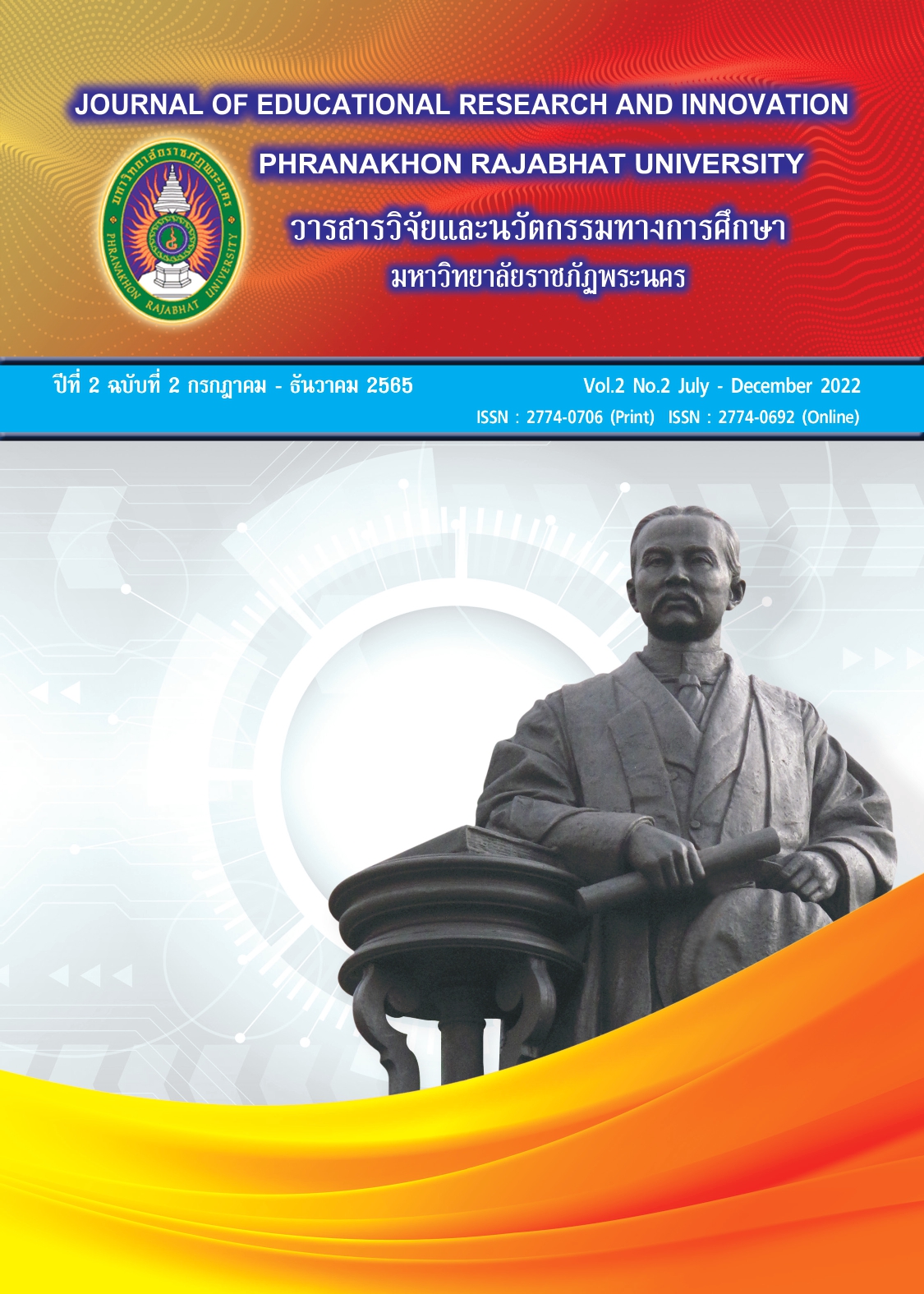การพัฒนาความสามารถในการคิดวิเคราะห์และผลสัมฤทธิ์ทางการเรียน เรื่อง ความร้อนและแก๊ส ของนักเรียนชั้นมัธยมศึกษาปีที่ 6 โดยการจัดการเรียนรู้แบบใช้ปัญหาเป็นฐาน
Main Article Content
บทคัดย่อ
การวิจัยนี้มีจุดประสงค์เพื่อพัฒนาความสามารถในการคิดวิเคราะห์และผลสัมฤทธิ์ทางการเรียน และหาแนวปฏิบัติที่ดีในการพัฒนาความสามารถในการคิดวิเคราะห์และผลสัมฤทธิ์ทางการเรียนวิชา ฟิสิกส์ เรื่อง ความร้อนและแก๊ส ของนักเรียนระดับชั้นมัธยมศึกษาปีที่ 6 ที่ได้รับการจัดการเรียนรู้แบบใช้ปัญหาเป็นฐาน กลุ่มที่ศึกษา คือ นักเรียนชั้นมัธยมศึกษาปีที่ 6 จำนวน 27 คน ภาคเรียนที่ 2 ปีการศึกษา 2563 ของโรงเรียนแห่งหนึ่งในจังหวัดปทุมธานี การวิจัยครั้งนี้เป็นการวิจัยปฏิบัติการในชั้นเรียน เครื่องมือที่ใช้ ได้แก่ แบบวัดความสามารถในการคิดวิเคราะห์ แบบวัดผลสัมฤทธิ์ทางการเรียน อนุทินของนักเรียน และบันทึกหลังสอนของผู้วิจัย วิเคราะห์ข้อมูลเชิงคุณภาพโดยการวิเคราะห์อุปนัย และวิเคราะห์เชิงปริมาณโดยการหา ค่าเฉลี่ย ร้อยละ และส่วนเบี่ยงเบนมาตรฐาน
ผลการวิจัยพบว่า การจัดการเรียนรู้แบบใช้ปัญหาเป็นฐานช่วยพัฒนาความสามารถในการคิดวิเคราะห์ของนักเรียนอยู่ในระดับดีมาก (= 30.19 คะแนน) และผลสัมฤทธิ์ทางการเรียนอยู่ในระดับดี (= 22.63 คะแนน) แนวปฏิบัติที่ดีในการจัดการเรียนรู้ ได้แก่ 1) การสร้างสถานการณ์ที่น่าสนใจและเป็นเรื่องใกล้ตัวร่วมกับการสร้างข้อจำกัดในการแก้ปัญหา 2) การใช้คำถามซักไซร้ไล่เรียงร่วมกับการใช้แบบบันทึกการแก้ปัญหาที่ 3) การแก้ปัญหาด้วยตนเองเป็นกลุ่มร่วมกับการใช้แรงเสริมทางบวก และ 4) การนำเสนอวิธีการแก้ปัญหาและการแลกเปลี่ยนเรียนรู้
Article Details
เอกสารอ้างอิง
Anderson, L. W., & Krathwohl, D. R. (2001). A taxonomy for learning, teaching, and assessing: a revision of bloom’s taxonomy of educational objectives. New York: Addison Wesley Longman.
Kemmis, S. and McTaggart, R. (1988). The Action Research Reader. Third edition. Deakin University Press, Victoria, 1988.
Chuliratchanikorn, T. (2009). Effects of verbal guiding techniques coupled with positive reinforcement on behavior coping with problems of students in Mathayom 1. (Thesis, Master's Degree). Srinakharinwirot University. Bangkok.
Daha K and Chantarakantee, E. (2014). Developing the ability to think and solve problems on momentum and impulse of students in Mathayomsuksa 4 by providing problem-based learning management. Continuation of the meeting Academic affairs of Kamphaeng Phet Rajabhat University Together with The Graduate Studies Network Rajabhat University (Northern Region). Kamphaeng Phet Rajabhat University. 147-155.
Huabloyfah, P. (2015). Developing analytical thinking skills of Prathomsuksa 6 students by using a quest for knowledge on the properties of substances. (Thesis, Master's Degree). Kasetsart University. Bangkok.
Jirathonphakdi, W. (2011). A study of learning achievement in Biology and analytical thinking abilities of Mathayomsuksa 6 students who received problem-based learning management. and learning management using the six-hat thinking technique. (Thesis, Master's Degree). Srinakharinwirot University. Bangkok.
Khamanee, T. (2006). The science of thinking. Bangkok: The Master Group Management.
Khamanee, T. (2001). Education and teaching. Bangkok: Publisher of Chulalongkorn University.
Kota, P. (2011). A study on science learning and analytical thinking achievement of Matthayomsuksa i students by using science activities learning packages on inquiry process and concept mapping. (Thesis, Master's Degree). Srinakharinwirot University. Bangkok.
Laohaphaiboon, P. (1999) Guidelines for teaching science. Third Edition. Bangkok: Thai Wattana Panich.
Ministry of Education. (2008). Handbook of learning management of science learning subject groups according to the curriculum. 2008 B.E. Basic Education. Bangkok: Department of Academic Affairs.
National Institute of Educational Testing. (2019). Average scores of O-NET test results of Mathayomsuksa 6, academic year 2019 classified by learning subject. Retrieved from https://data.go.th/sv/dataset/o-net-6-2019-by-content [23 January 2064].
Nongkladlod, T. (2011). A study of science learning achievement and analytical thinking abilities of mathayomsuksa 1 students who received cyclical learning, 7-step learning, and management. Learn using your brain as a base. (Thesis, Master's Degree). Srinakharinwirot University. Bangkok.
Nuankratok, J., Chauvatchrin, N, and Sirisawat, C. (2019). The effects of learning management using problem–based learning with higher–order questions on learning achievement in science and problem-solving ability on food and livelihood of 8th grade students. Journal of Education Naresuan University, (21)4, 93-106. (In Thai).
Phaangkhamta, C. (2011). Methods of teaching science at elementary level. Bangkok: April Rain Print Co., Ltd.
Potisart, J. (2014). Problem-based learning management of students in the bachelor of education program in physics (research report). Phranakhon Rajabhat University. Bangkok
Prue-Ngam, N and Limyingcharoen, N. (2011). Development of the ability to think critically and academic achievement in chemistry course on acid-base of students in Mathayom 5 by organizing problem-based learning activities. Educational Journalism Graduate Research Edition Khon Kaen University, 5(4), 12-20. (In Thai)
Songthiengchai, P. (2008). Economic development in the power of PBL. Nakhon Ratchasima: Nakhon Ratchasima Rajabhat University.
Srichiangha, C. (2010). Developing the concept of chemical equilibrium and attitude towards Chemistry of grade 5 students with learning management activities by model-based learning. (Thesis, Master of Education degree). Kasetsart University. Bangkok.
Sukhowatthanakit, J. (2013). The effect of examination teaching using learning resources on Physics learning achievement and analytical thinking ability of high school students. (Thesis, Master of Education degree). Chulalongkorn University. Bangkok.
The Secretariat of the Education Council. (2007). A model of learning management to develop children's ability to read, think, analyze, write, and create knowledge by themselves with an emphasis on learners. Bangkok: Sweet pepper Graphic.
Wongaiam, S., Chaiprasert, P., and Srisangyong, S. (2016). The development of learning achievement and ability in problems solving thinking in life and environment for grade 10 students using problem-based learning. Journal of Education Naresuan University, (18)2, 194-201. (In Thai)


